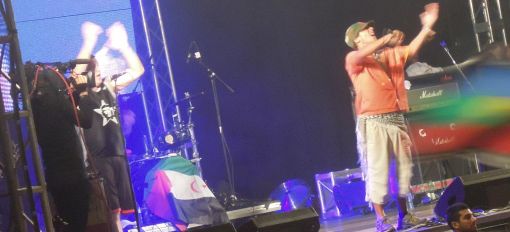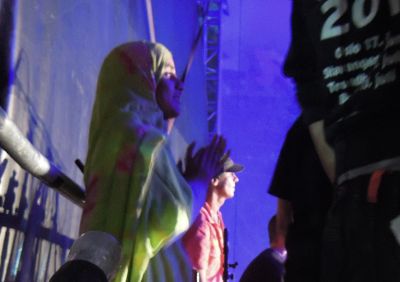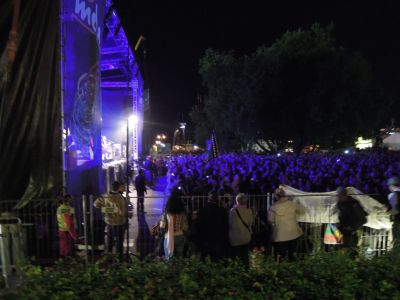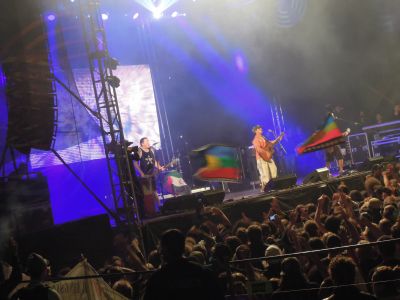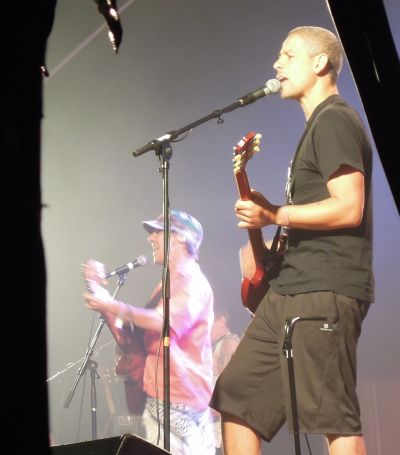
Kerry Kennedy and her daughter, Mariah Kennedy Cuomo, are with a delegation of human rights activists organized by the Robert F. Kennedy Foundation to look into human rights abuses in the Western Sahara, where there is conflict between the Sahrawi people and the government of Morocco. They arrived Sunday and will be in the Sahara for a week. Kerry Kennedy is the president of the foundation. The blog post below was written by Kerry Kennedy on Aug. 26, 2012, and given to Newsday Westchester.
Laayoune, Moroccan-Occupied Western Sahara
Despite his civilian dress, there was no mistaking the secret police when he reached across the front passenger seat of the Toyota to block the lens of my 17-year-old daughter Mariah’s Nikon from recording the beating of a woman by his colleagues, uniformed and not. Mariah’s shutter was too fast for him, so he lunged further in, in an attempt to snatch the camera, grazing her face. Mariah was fine. The woman was not.
A few hours later, Front Line Defenders director Mary Lawlor and Eric Sottas, founder of the World Organization Against Torture, went to the local hospital, where they visited the bloodied and bruised victim, Soukaina Jed Ahlou, president of Sahrawi Women Forum.
As witnesses, we were not alone. A handful of women in multicolored melhfas — the traditional Sahrawi garb, 20 feet of printed fabric wrapped around the body head to toe— surrounded their sister protester as the police harangued them.
We saw one local police officer in a blue uniform. Then there were the handful of thugs, identified to us by local human rights leaders as members of the DST, or Morocco’s version of the Stasi. In addition, there were the two plainclothes informants who had been following us all day — when Mariah took their pictures, they tried to shield their faces and then one ducked behind his car. Two of the brutes planted themselves in front of the windows of our car, partially blocking our view of the beating. The third one cursed Mariah, called her an unprintable name and blocked her camera with his hand.
RFK Human Rights Award laureate Aminatou Haidar recognized the DST thugs immediately. One of them, mustachioed and bald, Al Hasoni Mohamed, was the same man who accosted her 13-year-old son, threatening, “I will rape ‘til you’re paralyzed.”
Known as “the Sahrawi Gandhi,” Aminatou is one of Western Sahara’s most prominent human rights defenders. For more than 20 years, she has been involved in nonviolent resistance against Morocco’s occupation of her homeland. Moroccan authorities have illegally detained her, imprisoned her, beaten her, tortured her and threatened her with death. She once spent 4 1/2 years in isolation, blindfolded. Despite the abuse by officials, she considers Moroccan citizens her “brothers” and she courageously maintains her firm commitment to nonviolence as she advocates for the release of prisoners of conscience, seeks to strengthen local human rights monitoring mechanisms and demands that the referendum agreed to by all parties more than two decades ago — which will allow the people of Western Sahara to vote on their future — finally take place.
The violence we witnessed is not an isolated incident. We met a dozen women whose sons and husbands were beaten and remain in prison for their nonviolent activism. We met with a group of men who showed us home videos of nonviolent demonstrators being harrassed, kicked and beaten with nightsticks by uniformed police and their plainclothes colleagues. We met with a group of lawyers who said from 1999 forward it has represented more than 500 cases just like the one we witnessed today, nonviolent protesters bruised, bloodied and too often murdered, and always, always accused of some crime. Across all those years, the courts have acquitted only three Sahrawi victims.
The regional office of the Moroccan government claimed that Jed Ahlou was not beaten and that the entire incident was a mere show. It didn’t look like a show to us. Her wounds and swollen and discolored face looked all too real.
We are here for a week with a delegation from the Robert F. Kennedy Center for Justice and Human Rights to assess the human rights situation in both Western Sahara and the Algerian refugee camps where displaced Sahrawi live. We had a first glimpse on day one, seven days to go.
The Members of the RFK Center Delegation are Kerry Kennedy, president, Robert F. Kennedy Center for Justice and Human Rights (USA); Mary Lawlor, director, Front Line Defenders (Ireland); Margarette May Macaulay, judge, Inter American Court Judge(Jamaica); Marialina Marcucci, president, Robert F. Kennedy Center – Europe (Italy); Eric Sottas, former secretary general, World Organization Against Torture (Switzerland); María del Río, board of trustees, Fundación José Saramago (Spain); Santiago Canton, director of the RFK Partners for Human Rights, Robert F. Kennedy Center for Justice and Human Rights (Argentina); Marselha Gonçalves Margerin, advocacy director, Robert F. Kennedy Center for Justice and Human Rights (Brazil); Stephanie Postar, advocacy assistant, Robert F. Kennedy Center for Justice and Human Rights (USA); and Mariah Kennedy-Cuomo (USA).
